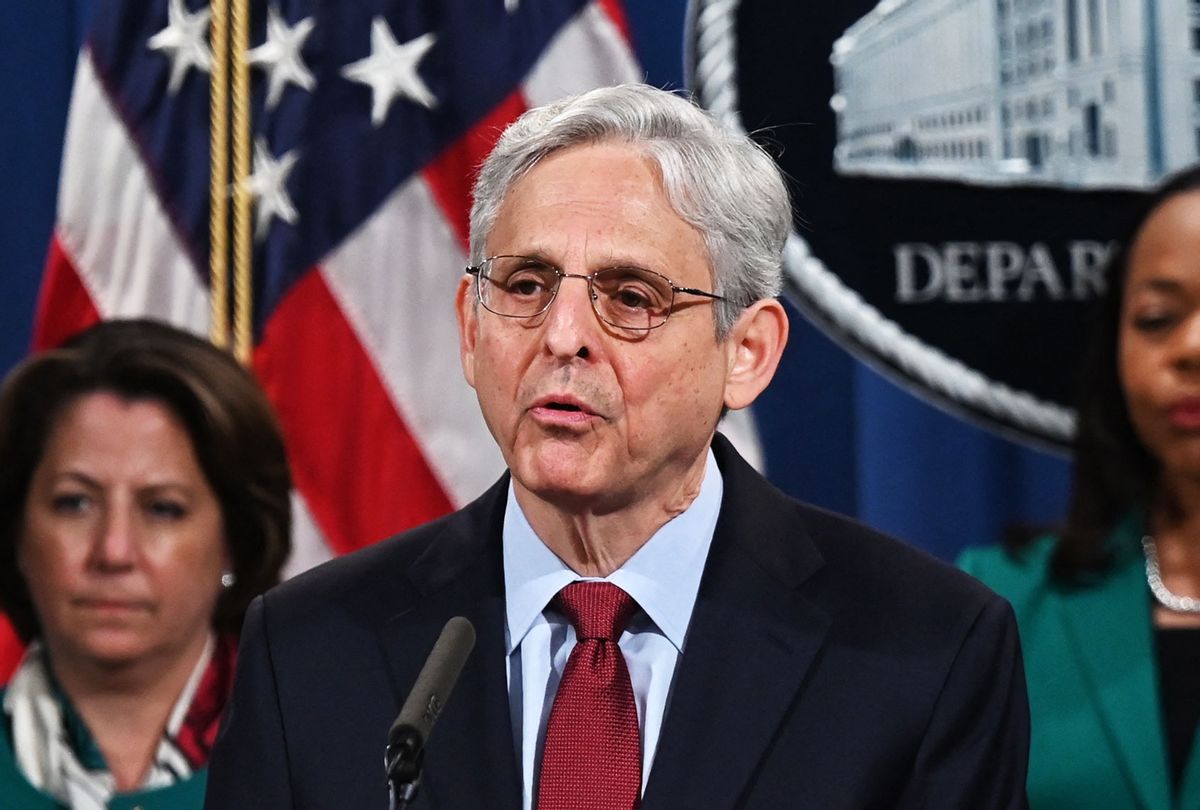The Justice Department filed an emergency order on Tuesday in a bid to immediately block Texas' near-total abortion ban after filing a lawsuit challenging the constitutionality of the law.
DOJ lawyers asked a federal judge in Texas to issue a temporary restraining order or preliminary injunction to halt the enforcement of Texas' Senate Bill 8, which created a six-week abortion ban, before most women know they're pregnant, enforced by a bounty hunter-type system that allows any citizen to sue abortion providers or anyone who helps a woman get an abortion and potentially win damages at least $10,000, with no penalty for losing. Providers say the law bans at least 85% of procedures that were previously performed in the state.
"This relief is necessary to protect the constitutional rights of women in Texas and the sovereign interest of the United States in ensuring that its States respect the terms of the national compact," the DOJ said in the filing. "It is also necessary to protect federal agencies, employees, and contractors whose lawful actions S.B. 8 purports to prohibit."
The DOJ further argued in the filing that the law is unconstitutional. "It is well-settled that the Fourteenth Amendment prevents states from banning abortion before a fetus is viable," the department said. "Because S.B. 8 has that effect, it is plainly unconstitutional under binding precedent."
The DOJ also argued that the law violates the Supremacy Clause, which gives federal law precedence over state law. The lawyers said that the law "irreparably injures" the federal government because it is explicitly designed to avoid court challenges.
Want a daily wrap-up of all the news and commentary Salon has to offer? Subscribe to our morning newsletter, Crash Course.
"The Act harms the United States' interest in ensuring that States do not evade their obligations under the Constitution and then try to insulate their actions from judicial review, as well as its interest in protecting the constitutional rights of women in its care and custody," the filing said. "To allow States to circumvent the Federal Constitution in this manner would offend the basic federal nature of the Union. Thus, the unconstitutionality of S.B. 8 alone suffices to establish irreparable harm."
The filing added that the law has resulted in an influx of women seeking abortion in other states, "overburdening out-of-state clinics and creating backlogs for residents of other states seeking care."
It's unclear when a judge might rule on the filing, though the request could make its way to the Supreme Court. The filing comes after the Trump-packed Supreme Court, by a 5-4 vote, refused to block the law from going into effect earlier this month. Liberal Justice Elena Kagan blistered the court in her dissent for allowing a law in "undisputed conflict" with the court's precedent to stand without a "full briefing or argument, and after less than 72 hours' thought." Fellow Justice Sonia Sotomayor said the "majority of Justices have opted to bury their heads in the sand," arguing that the law was "flagrantly unconstitutional" based on the court's precedent.
President Biden vowed a whole-of-government response to the "extreme" law, agreeing in a statement that it "blatantly violates the constitutional right established under Roe v. Wade and upheld as precedent for nearly half a century."
The DOJ filed a lawsuit last week, arguing that the law violates the 14th Amendment and the Supremacy Clause.
"Texas does not dispute that its statute violates Supreme Court precedent. Instead, the statute includes an unprecedented scheme to, in the Chief Justice's words, 'insulate the State from responsibility,'" Attorney General Merrick Garland said while announcing the lawsuit. "The obvious – and expressly acknowledged – intention of this statutory scheme is to prevent women from exercising their constitutional rights by thwarting judicial review for as long as possible. Thus far, the law has had its intended effect," he added.
As a result, abortion clinics have "ceased providing services," leaving women in the state "unable to exercise their constitutional rights and unable to obtain judicial review at the very moment they need it," Garland said, adding that this "kind of scheme to nullify the Constitution of the United States is one that all Americans — whatever their politics or party — should fear."
Abortion providers have also sued over the law, arguing that it violates the Roe v. Wade precedent. But the conservative 5th Circuit Court of Appeals in Texas abruptly canceled a planned hearing and denied an emergency motion sought by more than 20 abortion providers in August, prompting the Supreme Court challenge. The Supreme Court's refusal to block the law means that abortion providers can continue to litigate the case in court, but that process could take months or longer while the law is in effect.
Meanwhile, in state court, a Texas judge on Monday issued an injunction blocking the anti-abortion group Texas Right for Life from suing Planned Parenthood to enforce the abortion ban. Texas District Court Judge Karin Crump said the injunction would remain in place until at least April 2022, when the case is expected to head to trial.
"We are relieved that ... our providers and health care workers will now have some protection from frivolous suits as litigation against this blatantly unconstitutional law continues," Helene Krasnoff, Planned Parenthood's vice president for public policy litigation and law, said in a statement.
But the injunction only applies to Texas Right for Life and its affiliates, meaning other persons or organizations may still sue to enforce the law.
"This temporary injunction is an important step," Krasnoff said, "but it is not enough relief."



Shares